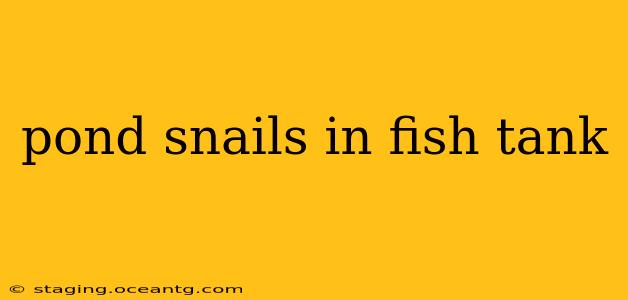Pond snails, those ubiquitous little mollusks, often find their way into fish tanks, sometimes uninvited. While they might seem innocuous at first glance, their presence can have both positive and negative impacts on your aquarium ecosystem. This comprehensive guide will explore everything you need to know about pond snails in fish tanks, addressing common concerns and providing practical solutions.
Are Pond Snails Harmful to Fish?
This is a frequently asked question, and the answer is generally no. Pond snails themselves don't directly harm fish. They aren't parasitic and won't actively attack or prey on your fish. However, a massive infestation can indirectly impact your fish's health by contributing to poor water quality. Excessive snail waste can lead to ammonia spikes, which are toxic to fish.
How Do Pond Snails Get Into My Fish Tank?
Pond snails often enter fish tanks through contaminated plants, substrate, or even on the surface of decorations. They're incredibly resilient and their eggs are incredibly small and difficult to detect, making complete prevention challenging. Even a tiny amount of contaminated water can introduce these persistent creatures.
How Can I Get Rid of Pond Snails in My Fish Tank?
Dealing with a pond snail infestation requires a multi-pronged approach. There's no single magic bullet, but combining several methods is often effective:
-
Manual Removal: This is the most straightforward method. Simply pick out the snails you see. This is most effective for smaller infestations.
-
Snail Traps: Commercially available snail traps lure snails with food, trapping them. These are effective but might not eliminate the entire population.
-
Natural Predators: Certain fish species, like some loaches and certain types of shrimp, are known to feed on snails. However, introducing new species requires careful research to ensure compatibility with your existing tank inhabitants.
-
Water Changes: Regular, large water changes help dilute snail waste and can disrupt their breeding cycle. This is a preventative measure as well as a reactive one.
-
Chemical Control: While there are chemical treatments available, these are generally considered a last resort. They can harm your fish and disrupt the delicate balance of your aquarium. It’s crucial to follow the instructions precisely and research potential side effects before using any chemical treatment.
What Do Pond Snails Eat in a Fish Tank?
Pond snails are primarily scavengers. They feed on decaying organic matter, algae, and leftover fish food. This can be beneficial as they contribute to cleaning up waste, but an overabundance can indicate an issue with overfeeding or poor water maintenance.
Are Pond Snails Good for My Fish Tank?
The answer is nuanced. In small numbers, pond snails can be beneficial, acting as natural cleaners, consuming algae and detritus. However, large populations can lead to problems with water quality and competition for resources. The key is maintaining a balance.
How to Prevent Pond Snails in My Fish Tank?
Prevention is always better than cure. Here are some key preventative steps:
-
Quarantine New Plants: Before adding any new plants to your tank, thoroughly rinse them and quarantine them in a separate container for a few weeks to observe for any unwanted guests.
-
Inspect Decorations: Carefully inspect any new decorations before adding them to your main tank.
-
Maintain Good Water Quality: Regular water changes and proper filtration are crucial in preventing snail infestations and maintaining a healthy environment for your fish.
-
Avoid Overfeeding: Overfeeding contributes to excess organic matter, creating an ideal breeding ground for snails.
By understanding the biology and behavior of pond snails, and by employing a combination of preventative measures and control methods, you can effectively manage their presence in your fish tank, maintaining a healthy and balanced aquarium environment. Remember to always prioritize the health and well-being of your fish.
